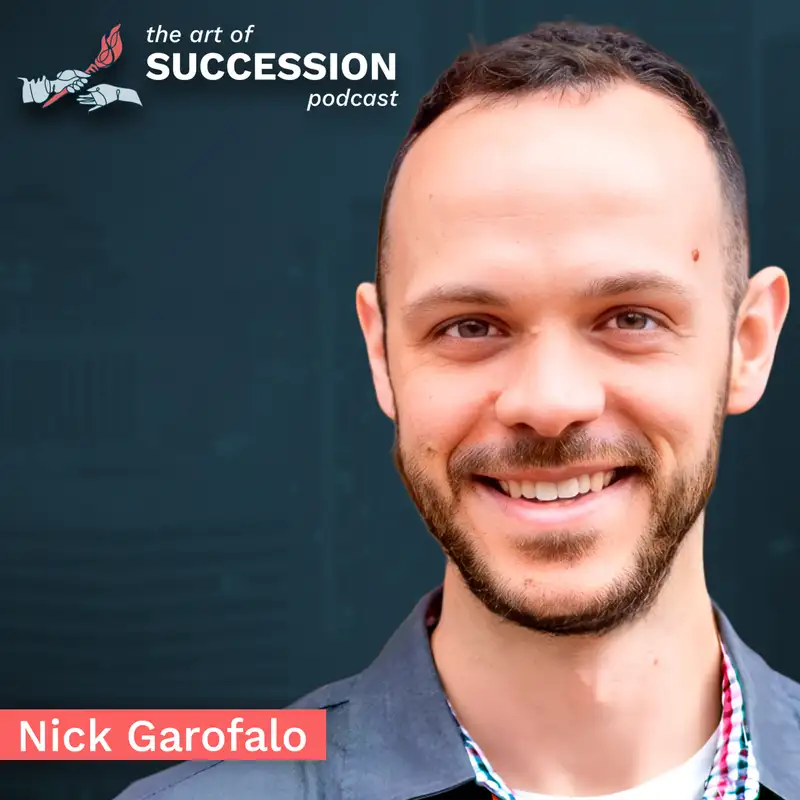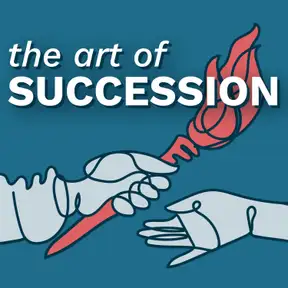He Watched Dad Bet Too Much On The Business Sale
In this episode of The Art of Succession podcast, host Barrett Young interviews Nick Garofalo, founder of OpenHanded Wealth and former executive at Court Solutions, a payment processing company for traffic court fines that was successfully sold in 2017.
Building a Business That Solves Real Problems
Nick's father, though not tech-savvy himself, built an innovative payment processing company that transformed how people paid traffic tickets. "This internet thing is really cool," Nick recalls his father thinking, "it makes so much sense for people to be able to file court paperwork online instead of having to come stand in line." The company's success came from deeply understanding their customers' unique challenges and creating solutions that made court clerks' lives easier. "The real money comes from rich relationships with those customers, knowing the nuance of their particularities," Nick explains.
The Acquisition Journey
After Nick and his brother decided against taking over the family business, they prepared for an external sale. "We had to do a lot of cleanup and structure building to make the company appealing to an acquirer," Nick shares, noting they needed to formalize many aspects of the business that were previously based on handshakes. After rejecting an unfavorable initial offer, they connected with a consolidator who purchased the entire operation. Nick stayed with the acquiring company for nearly seven years, developing valuable skills in a corporate environment while supporting his growing family.
The Entrepreneur's Retirement Gap
Nick's experience watching his father bet everything on the business sale led him to identify a critical problem many business owners face: the post-sale income gap. "You're company's making 5 million, you're taking home 500,000... you sell it for two or three million and now you're going to have 80 or 120 grand a year in 4% income. What are you going to do?" This realization, combined with seeing his father miss opportunities for retirement planning, ultimately inspired Nick to launch his financial planning practice focused on helping entrepreneurs. "If you got into business, it wasn't so that you could work 90 hours a week at the expense of your family and friends," he advises.
🎙️Full show notes, guest information, and video version of this episode available at https://gwcpas.com/blog/aos-nick-garofalo
✍️ Leave feedback for the show. I’d love to hear your input https://quark-fir-a64.notion.site/1d9dd04222f380ae96c9caae27bc1c66?pvs=105
I'm looking to hear from 5 listeners via Zoom as I start to plan for Season 3 https://calendly.com/beygwcpas/aos-feedback
The Art of Succession Podcast is brought to you by GWCPA. Twice a month on https://www.youtube.com/@gwcpas, CPA and Partner Barrett Young explores the emotional and strategic challenges of leadership transition, offering honest insights and actionable advice for successors and founders.
If you've enjoyed this episode, please share it with others. It truly helps.
Disclaimer: This podcast is for informational purposes only and does not constitute legal, tax, or accounting advice. You should consult your own advisors before making decisions related to your situation. If you don’t have an advisor yet, reach out!
Building a Business That Solves Real Problems
Nick's father, though not tech-savvy himself, built an innovative payment processing company that transformed how people paid traffic tickets. "This internet thing is really cool," Nick recalls his father thinking, "it makes so much sense for people to be able to file court paperwork online instead of having to come stand in line." The company's success came from deeply understanding their customers' unique challenges and creating solutions that made court clerks' lives easier. "The real money comes from rich relationships with those customers, knowing the nuance of their particularities," Nick explains.
The Acquisition Journey
After Nick and his brother decided against taking over the family business, they prepared for an external sale. "We had to do a lot of cleanup and structure building to make the company appealing to an acquirer," Nick shares, noting they needed to formalize many aspects of the business that were previously based on handshakes. After rejecting an unfavorable initial offer, they connected with a consolidator who purchased the entire operation. Nick stayed with the acquiring company for nearly seven years, developing valuable skills in a corporate environment while supporting his growing family.
The Entrepreneur's Retirement Gap
Nick's experience watching his father bet everything on the business sale led him to identify a critical problem many business owners face: the post-sale income gap. "You're company's making 5 million, you're taking home 500,000... you sell it for two or three million and now you're going to have 80 or 120 grand a year in 4% income. What are you going to do?" This realization, combined with seeing his father miss opportunities for retirement planning, ultimately inspired Nick to launch his financial planning practice focused on helping entrepreneurs. "If you got into business, it wasn't so that you could work 90 hours a week at the expense of your family and friends," he advises.
🎙️Full show notes, guest information, and video version of this episode available at https://gwcpas.com/blog/aos-nick-garofalo
✍️ Leave feedback for the show. I’d love to hear your input https://quark-fir-a64.notion.site/1d9dd04222f380ae96c9caae27bc1c66?pvs=105
I'm looking to hear from 5 listeners via Zoom as I start to plan for Season 3 https://calendly.com/beygwcpas/aos-feedback
The Art of Succession Podcast is brought to you by GWCPA. Twice a month on https://www.youtube.com/@gwcpas, CPA and Partner Barrett Young explores the emotional and strategic challenges of leadership transition, offering honest insights and actionable advice for successors and founders.
If you've enjoyed this episode, please share it with others. It truly helps.
Disclaimer: This podcast is for informational purposes only and does not constitute legal, tax, or accounting advice. You should consult your own advisors before making decisions related to your situation. If you don’t have an advisor yet, reach out!

